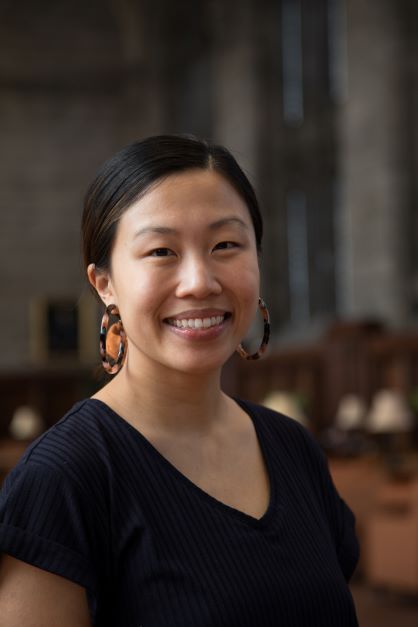The IES Predoctoral Training Programs prepare doctoral students to conduct high-quality education research that advances knowledge within the field of education sciences and addresses issues important to education policymakers and practitioners. In recognition of Asian American and Pacific Islander Heritage Month, we asked two predoctoral scholars who are embarking on their careers as education researchers to share their career journeys, perspectives on diversity and equity in education research, and advice for emerging scholars from underrepresented backgrounds who are interested in pursuing careers in education research. Here is what they shared with us.
 Na Lor (University of Wisconsin-Madison) is currently a PhD candidate in educational leadership and policy analysis where she is studying inequity in higher education from a cultural perspective.
Na Lor (University of Wisconsin-Madison) is currently a PhD candidate in educational leadership and policy analysis where she is studying inequity in higher education from a cultural perspective.
How did you become interested in a career in education research? How have your background experiences shaped your scholarship and career?
I view education institutions as important sites of knowledge transmission with infinite potential for addressing inequity. In addition, my background as a Hmong refugee and a first-generation scholar from a low-income family informs my scholarship and career interests. My positive and negative experiences growing up in predominantly White spaces also shape the way in which I see the world. Meanwhile, my time spent living abroad and working in the non-profit sector further influence my ideals of improving the human condition. With my training through IES, I look forward to conducting education research with a focus on higher education in collaboration with local schools and colleges to better serve students and families from underserved communities.
In your area of research, what do you see as the most critical areas of need to address diversity and equity and improve the relevance of education research for diverse communities of students and families?
I see ethnic studies, culturally sustaining pedagogies, and experiential learning in postsecondary education as core areas in need of improvement to provide relevant education for an ever-diverse student body. Likewise, I see community college transfer pathways as crucial for addressing and advancing equity.
What advice would you give to emerging scholars from underrepresented, minoritized groups who are pursuing a career in education research?
Chase your burning questions relentlessly and continuously strengthen your methodological toolkit. Embrace who you are and rely on your lived experience and ways of knowing as fundamental assets that contribute to knowledge formation and the research process.
 Helen Lee (University of Chicago) is currently a PhD candidate in the Department of Comparative Human Development where she is studying the impact of racial dialogue and ethnic community engagement on the identity and agency development of Asian American youth.
Helen Lee (University of Chicago) is currently a PhD candidate in the Department of Comparative Human Development where she is studying the impact of racial dialogue and ethnic community engagement on the identity and agency development of Asian American youth.
How did you become interested in a career in education research? How have your background and experiences shaped your scholarship and career?
I first considered a career in education research while completing my Master’s in educational leadership and policy at the University of Michigan-Ann Arbor. I had entered my program in need of a break after working as a classroom teacher, organizer, and community educator in Detroit for five years. During my program, I had the opportunity to reflect on and contextualize my experiences in and around public education. It was also during my program that I first came across scholarship that aligned to my values and spoke to my experiences as a teacher in under-resourced communities and as a first-generation college graduate.
Taking classes with Dr. Carla O’Connor and Dr. Alford Young, working with Dr. Camille Wilson, and engaging with scholarship that counters deficit notions of people of color was a critical turning point for me. The work of these scholars motivated me to pursue a path in education research. Since then, I’ve been fortunate to meet other scholars who conduct community-based and action-oriented research in service of social justice movements. These interactions, along with the opportunities to collaborate with and learn from youth and educators over the years, has sustained my interest in education research and strengthened my commitment to conducting research that promotes more equitable educational policies and practice.
In your area of research, what do you see as the most critical areas of need to address diversity and equity and improve the relevance of education research for diverse communities of students and families?
My current research examines the racial socialization experiences of Asian American youth in relation to their sociopolitical development. This work is motivated by my own experiences as an Asian American, my work with Chinese and Asian American-serving community organizations, and a recognition that Asian American communities are often overlooked in conversations about racism due to pervasive stereotypes.
Education research must be better attuned to the history and current manifestations of racism. That is, research should not only consider the consequences of systemic racism on the educational experiences and outcomes of marginalized communities but also challenge and change these conditions. I believe there is a critical need for scholarship that reimagines and transforms the education system into a more just and humanizing one.
What advice would you give to emerging scholars from underrepresented, minoritized groups who are pursuing a career in education research?
I would provide the following advice:
- Clarify what your purpose is—the reason why you are engaged in this work. This will help guide the opportunities you pursue or pass on and connect you to the people who can support your development toward these goals. Your purpose will also serve as a beacon to guide you in times of uncertainty.
- Seek out mentorship from scholars whose work inspires your own. Mentorship may come from other students as well as from those outside of academia. It may stem from collaborations in which you participate or simply through one-time interactions.
- Be attuned to your strengths and your areas of growth and nurture both accordingly. In retrospect, I could have done a better job of recognizing my own assets and engaging in diverse writing opportunities to strengthen my ability to communicate research across audiences.
- Continuously put your ideas and research in conversation with the ideas and research of others. This enables growth in important ways—it can open you up to new perspectives and questions as well as strengthen your inquiry and understanding of your findings.
- Engage in exercises that nurture your creativity and imagination and participate in spaces that sustain your passion for education research. A more just and humanizing education system requires us to think beyond our current realities and to engage in long-term efforts.
This year, Inside IES Research is publishing a series of blogs showcasing a diverse group of IES-funded education researchers and fellows that are making significant contributions to education research, policy, and practice. For Asian American and Pacific Islander (AAPI) Heritage month blog series, we are focusing on AAPI researchers and fellows, as well as researchers that focus on the education of AAPI students.
Produced by Katina Stapleton (Katina.Stapleton@ed.gov), co-Chair of the IES Diversity and Inclusion Council and training program officer for the National Center for Education Research.